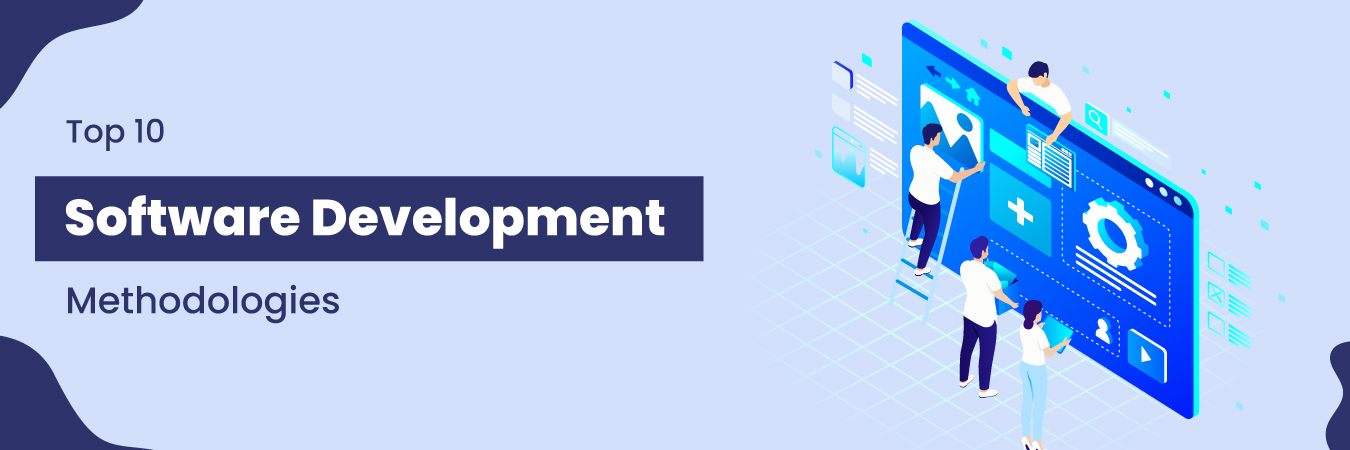
Top 10 Software Development Methodologies
Software development is much more than slinging code. Rather, it is complex, extensive and strategic.
Besides, given that the world relies on software, you must think of it as a strategic asset that demands the right vision, purpose, expectations and yes, the appropriate methodology.
Software development methodologies are like battle plans. They define structure, roles and serve as directors, guiding your team towards a common goal – developing software that redefines user experience and contributes to business growth.
Top Software Development Methodologies –
1. Agile Software Development Methodologies
Agile is amongst the most popular and widely adopted methodology today.
It is an approach rather than merely a framework that drives adaptability, fosters collaboration, and enables iterative development.
Agile teams work in short cycles called sprints These help them adapt quickly to changing requirements. The methodology suits projects with evolving requirements.
2. Scrum
A subset of Agile, Scrum is used for projects with constantly changing requirements.
Scrum involves hiring professionals like Scrum Master and Product Owners, who conduct daily stand-ups and sprint reviews.
The methodology also ensures accountability and transparency.
It works well with teams that need structured Agile processes with defined roles and responsibilities.
3. Kanban
Another popular software development methodology on this list is Kanban.
It emphasizes visualizing workflows and limiting work in progress to improve efficiency.
Kanban teams use boards to track tasks from the start to the endpoint, ensuring a steady flow of the project’s development and progress.
The methodology is popular within teams that look for continuous delivery and enhanced workflow visualization.
4. Waterfall
Waterfall is a conventional software development methodology.
It adheres to a linear, and sequential approach, where the team must complete every phase from requirements to deployment before moving to the next.
Although not as flexible as its modern counterparts, Waterfall’s structured nature makes it suitable for projects with properly defined requirements.
Accordingly, it works incredibly well with projects that have clear, fixed requirements and do not need multiple iterations.
5. DevOps
Calling DevOps a methodology would be underrating it. It is because DevOps goes beyond just a methodology. Instead, it transcends to a culture that connects development and operations.
The approach involves integrating continuous integration/continuous deployment (CI/CD) practices, to enable faster delivery, reliability, and collaboration.
Thus, businesses looking to drive seamless collaboration between development and operations teams can use DevOps.
Nevertheless, over the years, DevOps has evolved to become a popular approach.
Today, it is adopted by almost every company, as everyone wants their teams to reduce friction between teams and collaborate productively.
6. Lean Software Development
Inspired by manufacturing principles, Lean is a widely used software development methodology focused on optimizing value while reducing waste.
The approach encourages incremental delivery of features, ensuring that the team only builds functionalities necessary to the software application.
Lean is a better choice for companies and teams that seek efficiency and ensure value-driven development.
7. Extreme Programming (XP)
XP focuses on achieving engineering excellence.
It involves leveraging practices like test-driven development (TDD), pair programming, and frequent releases, the methodology aims to help enhance software quality and responsiveness.
Accordingly, XP is ideal for software teams that prioritize technical rigor and quick, high-quality deliveries.
8. Feature-Driven Development (FDD)
This is a practical software development methodology that combines planning with frequent, feature-based deliveries. FDD focuses on developing and delivering small, functional features consistently throughout the project.
Companies with large-scale projects that require iterative feature releases usually adopt the FDD software engineering methodology.
9. Prototype Software Development Methodology
This methodology enables developers to work on the final product’s prototype version.
The customer then tests and evaluates the prototype, providing developers feedback.
Once developers have customer feedback, the prototype undergoes numerous iterations, refining the product, until the customer is satisfied about it.
The process suits when developers build software with several unknowns. Developers use this approach when they must find out what works best with users.
10. RAD (Rapid Application Development)
RAD is another methodology that many businesses worldwide use.
It focuses less on the planning phase and rather encourages software development teams to emphasize core tasks like modeling, prototyping and testing.
Focusing on these tasks enables developers to quickly deliver product prototypes to clients and then gather feedback to add improvements to the model.
While it is suitable for companies of varying sizes, it suits projects where the development team must deliver the product quickly (have a tight deadline) or if the prototype undergoes multiple changes.
How to Choose the Right software engineering methodology?
There’s nothing like the best methodology as each has its unique pros and cons.
What matters is if the methodology you’ve chosen is best-suited for your project.
The right choice often depends on the project’s needs, complexity, timelines, team’s capabilities and client requirements.
For instance, Agile software development methodology may suit a startup or SME with rapid and constant evolution. However, on the other hand, Waterfall may suit a company with fixed specifications.
Understanding these methodologies can help you train your team and hire the right resources. Besides, you don’t have to necessarily follow a single methodology. You can identify the right ones and combine them to meet your project’s custom needs.
If you need assistance identifying the right approaches, combining them and implementing them to complete your software development project efficiently, Fidel has got you covered.
With a clientele spread across multiple continents and over a decade of experience developing software, we prove the right and reliable partner.
Our track record comprises success software development for businesses form various domains with varying technical and strategic requirements.
Want to know more or talk to our experts? Email us at sales@fidelsoft.com.
Ref. No – FB02251001
